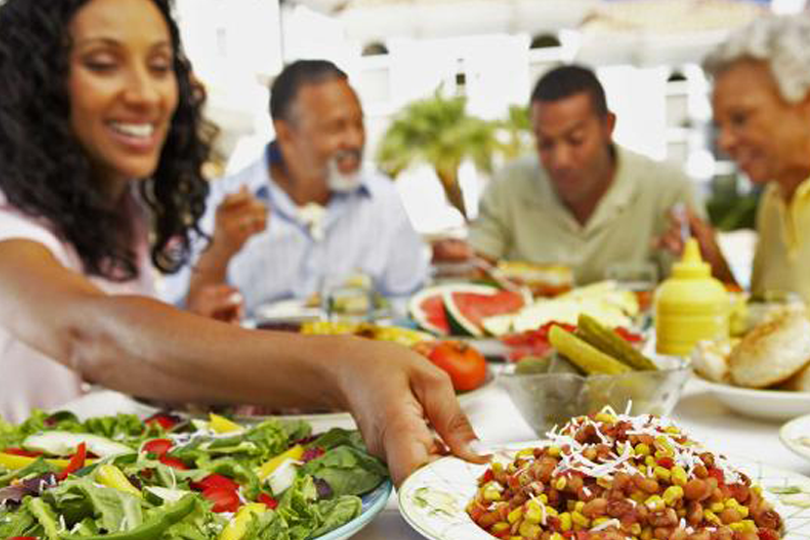Vegetarian eating has become increasingly popular in today’s world, which has made it easier and much more convenient for people to switch to a vegetarian diet. Because more people are choosing to eat vegetarian, more vegetarian options are available in grocery stores, restaurants, cook books, schools, and elsewhere in mainstream society. A vast wealth of vegetarian information, ideas, products, and recipes are now available on the Internet.
Why the switch? People are switching for personal health reasons, environmental health, ethical, theological, and even financial reasons. (This excellent Vegetarian Times article goes into more detail about why many people make the switch.)
In the ancient yoga texts, it is explained that the type of food a person eats cultivates a certain type of consciousness. Vegetarian food (which in the yoga system includes dairy, but not eggs) is said to cultivate a Sattva type of consciousness. Sattva mode of consciousness is the “mode of Goodness.” It is a calm, peaceful, harmonious state of consciousness. When in Sattva mode, one can cultivate a more peaceful and harmonious lifestyle and can more readily grasp higher wisdom. This is not to say that simply eating a vegetarian diet will automatically put one in a peaceful state of mind and body, but switching to a vegetarian diet (especially a whole-foods diet) can greatly assist a person in cultivating a more peaceful and harmonious life.
If switching to a vegetarian diet is something you are wanting to do, here is some advice for making the switch.
Write down your reasons. Figure out why you, personally, are choosing to switch to a vegetarian diet and write your reasons down on paper. Post the paper in your kitchen (or in your personal space) and also make a copy to carry with you. If there are times when you are tempted to give up or go astray, re-read your reasons – remind yourself why it is important to you to be doing what you are doing and allow yourself to honor your higher aspirations. If transitioning to vegetarian with your whole family, this is an activity you can do together. Make a colorful poster together or inspiration book with hand-drawn pictures. You can even do a blog or Facebook page of your journey to encourage and inspire others.
Be realistic. Are you the type of person who can make drastic changes easily? Or are you more successful with gradual change? Are you making the switch by yourself or are you transitioning as a family? If you are choosing the gradual approach, you may want to start with one or two days per week of eating vegetarian then gradually increasing the number of days per week until you are eating completely vegetarian. Another gradual approach is to remove one animal the first week, then one additional animal per week until you are eating completely vegetarian.
Keep your eye on the big picture. In the larger scheme of things, you probably want not only to be eating a vegetarian diet, but a healthy vegetarian diet. However, in the beginning, be especially easy on yourself. Take advantage of vegetarian food in restaurants and the amazing variety of pre-made vegetarian food at local grocery stores to assist you in staying on track. If treating your family to their favorite meatless pizza a couple times per week, using premade meat-substitutes, allowing kids to top foods with ketchup or grated cheese, or having a ice-cream sundae celebration at the end of each successful week of vegetarian eating makes it easier for you to maintain and more fun for everyone, then it’s healthful in the bigger picture. Experiment with easy vegetarian whole foods recipes and healthy condiments along the way and make your own recipe book full of the well-liked ones. Remember, especially in the beginning, make it as easy as possible. You can fine-tune your eating as time goes on.
Make the switch with a friend. If possible, find a friend or even a Facebook buddy to make the switch with you. Not only will you be encouraging to each other, but you can share ideas, recipes, and maybe even dinner once a week at your favorite vegetarian-friendly restaurant.
Learn the plant sources for your essential nutrients. Some people are concerned about not getting enough protein or iron or B-12 in their diets on an animal-free diet. If you are concerned about not getting enough of a particular nutrient that you were previously getting through animal sources, simply do a little research on the Internet. Whatever nutrients you can obtain through eating animals are also available through plant-based sources. You can also take whole-food supplements or buy vitamin-enriched vegetarian foods.
Keep it simple. Stick to quick & easy recipes, especially in the beginning. There are plenty of easy vegetarian recipes available for free on the Internet. And there are many vegetarian meals that can be made with the same basic ingredients – such as rice & beans, pasta & tempeh, tofu & veges – then just add a tasty sauce and viola, you have a delicious new meal. Take advantage of pre-made sauces or make your own!
Have fun! Think of it this way, by switching to a vegetarian diet, you are walking into a whole new world of culinary delights. Explore, experiment, and enjoy!
Remember to nourish yourself spiritually. If you are nourished and happy on a spiritual level, it will help you to make healthy choices for your mind and body. When we are satisfied in our hearts, feeling full of love and peaceful in our hearts, we are less likely to be swayed by cravings for foods and activities that are undesirable. Fill yourself spiritually every day and you will find it much easier to be satisfied on other levels.
Here are a few more web resources to encourage and inspire you:
Physicians Committee for Responsible Medicine
People have been eating healthy vegetarian diets since time immemorial – you can, too.

